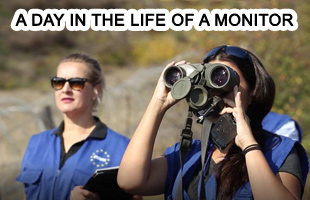On 5 June, the European Union Monitoring Mission (EUMM) marked the World
Environment Day by organising a series of outreach activities in its three
Field Offices. These events aimed at raising awareness about the importance of
environmental protection and its link to safety and security. Partnering with
NGOs and other stakeholders, EUMM engaged in a variety of educational and
hands-on events to highlight the significance of preserving the environment for
future generations.
EUMM monitors, together with the experts from Rural Communities
Development Agency (RCDA) visited a school near the Prezeti IDP Collective
Centre and conducted interactive sessions with schoolchildren, including a
drinking water quality workshop. The students also participated in an
environment-themed art contest, with winners receiving special gifts from EUMM.
The day culminated in a tree-planting ceremony in the school yard, fostering a
sense of responsibility and connection to nature among the young participants.
.jpg)
In another initiative, EUMM partnered with the NGO CENN and organised a
clean-up drive with pupils from three schools near the Administrative Boundary
Line (ABL). The collaborative effort successfully removed over 100 kg of waste,
contributing to a cleaner environment for the conflict-affected population.
EUMM
also donated plants to Zugdidi botanical garden, specifically selected based on
the needs of the garden and participated in their planting together with the
botanical garden staff.
Through these activities, EUMM underscores its commitment to sustainable
use of natural resources, especially in the villages near the ABL, where
sustainable practices are particularly important due to the socio-economic
challenges faced by the conflict-affected communities.
World Environment Day has its roots in the 1972 Stockholm Conference,
which was a pivotal moment in placing environmental issues on the global
agenda. The conference resulted in the Stockholm Declaration and Action Plan
for the Human Environment, which included 26 principles emphasising the need
for sustainable management of natural resources.


